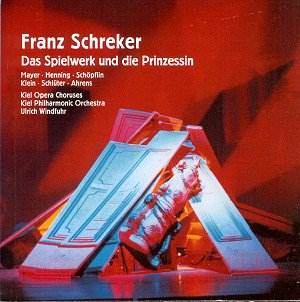The excellent CPO label continues to put us in
its debt by exploring the wealth of rare repertoire still unrecorded.
Their Schreker series is turning out to be one of the most valuable,
with their recording of Flammen attracting particular praise.
This set sees them turning their attention to one of his rarest
and least performed operas, The Music Box and the Princess
and, as the recording date shows, they have wasted no time in
getting it onto the shelves.
The work itself was much anticipated in the Vienna
of 1913, especially after the success of what has turned out to
be his best known piece, Der
Ferne Klang (The Distant Sound). Unfortunately for Schreker
the critical mauling given to the new opera by the all-powerful
Julius Korngold ensured it was buried after only five performances.
Despite the composer trying to resurrect it in one-act form the
piece has had to wait until this Kiel production (some ninety
years after the premiere) to be re-assessed in its original form.
Listening to these discs and following the libretto
leaves one with an oddly mixed feeling. In a nutshell, there is
much glorious music that is worth getting to know, but one has
to put up with a lot of post-Freudian psychobabble along the way.
Of course this is typical of so many operas from this fin-de-siècle
period (Strauss’s Die Frau Ohne Schatten was started
the following year and shares similar problems) but at least we
can try to listen with our cool, post-modern objectivity. The
prelude is perfectly representative of Schreker’s plush harmonic
and orchestral palette. Wagner’s ghost looms large, with references
to the Valhalla motif from Das Rheingold as well as fleeting
wisps of Parsifal. This is also to be expected from the
period, and does not really detract from the heady, sumptuously
evocative sound-world Schreker so expertly conjures up.
The plot is also a complex mixture of elements
so beloved of the late Romantic composers. It fuses symbolism,
eroticism, a blurring of dream and reality and enough traits of
popular fairy tale culture for the booklet to refer to it as a
‘fin-de-siècle Magic Flute’, which is not far off
the mark. It all ends in a sort of Tristan-esque rapture
and is very easy to revel in, especially if you have a fondness
for musical excess of this kind, as I most definitely have.
The enjoyment is due in no small measure to the
thoroughly committed performances. The company at Kiel is becoming
masterly at this sort of repertoire, and the orchestral contribution
under Ulrich Windfuhr is a real highlight of the set. On the vocal
front the main duo of Thomas L. Meyer and Julia Henning are certainly
on top of their very taxing parts, with sharply etched characterisations
and hints of strain only occasionally showing. The best performance
for me comes from Hans-Jürgen Schöpflin, who not only
possesses a fine lyric tenor voice but also has the most interesting
part of the Wotan-like Journeyman.
The recording is full bodied and clear, with
balance slightly favouring the singers over the orchestra. Stage
noise is (happily) relatively minor, which is probably due to
what looks from the booklet photos like a fairly abstract, minimalist
production. The notes go into some detail about general cultural
issues of the time, making a reasonably readable attempt to put
the opera into a correct perspective, and there is the all-important
text and translation. Recommended heartily to those fond of exploration,
albeit needing something of a sweet tooth.
Tony Haywood
